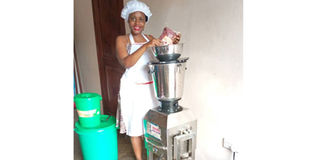Her business was inspired by nutrition

Nanziri is adding value to groundnuts and making money. courtesy photos
What you need to know:
Out of the box. Because of her busy working schedule, Musoke needed to earn but most importantly, she needed to keep an eye on the health of her children. This is how her business story unfolds, writes Pauline Bangirana.
After resigning from formal employment in 2018, a business in ground nuts was the last thing on her mind.
Musoke, a wife and mother of four, was a nurse whose work schedule did not allow her to have enough time with her children.
“My children were malnourished. I used to work night duty and I had challenges with househelps,” she says.
While working as a nurse, she observed underweight patients being given certain kind of groundnuts to boost their nutrition. But even then, she had never thought of earning from it.
“This business was birthed through prayer. I was in church and the preacher asked us to present our business ideas. He prayed for us and commissioned us to start small startups,” Musoke says.
She says at that time, she was pursuing a diploma course in leadership. From her hospital experience, Musoke decided to bring that home. She mixed groundnuts, add silver fish, nkejje and her children became healthy again.
She adds value to groundnuts. She makes groundnut paste, groundnut paste with mushrooms, groundnut paste with amaranthus, silver fish and granule, peanut butter -plain and medicinal one for immune suppressed patients. She also makes soap and vaseline out of groundnuts.
Musoke says although the first years were difficult, she is optimistic that she will reap big in the near future. Because of her medical background, she puts the health of her clients before anything else.
With capital worth Shs700,000, she bought her first bag of ground nuts and that was her beginning. She later managed to acquire a stainless steel machine which she started using to grind the groundnuts.
She says: “The business has grown and the number of customers have multiplied. As the business grows, I have also gained more knowledge about this business and the products I sell.”
Through this business, she has grown a social network. She has met President Yoweri Museveni, the Kabaka of Buganda, the Nnabagereka and other influential leaders and entrepreneurs. Through this business, Musoke is able to support her family financially.
She prides in providing a healthy, nutritious product to her family and her clients. Through her business, she has inspired other women and girls to start small and grow bigger.
However, despite the benefits, Musoke admits that she has learnt on the job since she had no prior knowledge in entrepreneurship. Although she has registered some losses along the way, she believes this has been a milestone.
“Groundnut seeds vary in shape, size, colour, texture and taste. The challenge is in getting quality seeds and having constant delivery of the good quality seeds,” she says.
She says some of her clients delay to make payments yet one needs a regular cash flow to keep the business going. Fluctuating prices of groundnut seeds and expanding the market are some of the hurdles she has had to encounter.
“Start with the little that you have and grow through every challenge. Make friends, grow your networks because exposure is very key. Learn from other businesswomen. Be driven by passion, inspiration because this makes all the difference,” she says.
Her products prices range from Shs7,000 to Shs6,000 for pastes with added mushrooms. Peanut butter goes for Shs15,0000 although prices are predetermined by the product.
Lucrative
Nanziri says in a week, she produces between 800kgs to 1000kgs depending on the orders available.
Unlike peanut that is produced monthly, production depends on the season. For example, during back to school season, the demand for her products is high.
She says on a good day, she makes profits ranging from Shs100,000 to Shs200,000 a day. She currently employs three part time workers and one full time employee. She sells her products to the community, patients in hospital, schools, shops and supermarkets.


